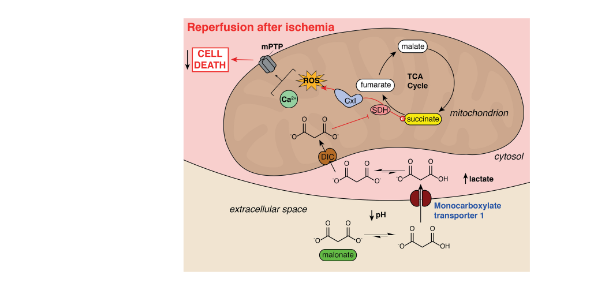
Submitted by Penny Peck on Fri, 02/09/2022 - 17:17
A collaborative research study led by Professors Mike Murphy (MBU) and Thomas Krieg (Experimental Medicine and Immunotherapeutics [EMIT]) has been published in Circulation Research and is the subject of an Editorial comment.
The mitochondrial metabolite succinate drives the ischemia/reperfusion (IR) injury occurring in heart attacks. This is because succinate dramatically accumulates during ischemia (when the blood supply is blocked) and is rapidly metabolised on reperfusion (when the blood supply is restored) by the mitochondrial enzyme succinate dehydrogenase (SDH). This process produces the reactive oxygen species superoxide which orchestrates the cell death associated with heart attack.
This new work showed that malonate, an inhibitor of SDH could slow down succinate metabolism on reperfusion and prevent damage in models of heart attack. As well as being cardioprotective, malonate also preferentially enters the heart tissue that has been exposed to ischemia, rather than the healthy tissue. Ischemic tissue has lowered local pH which facilitates malonate’s entry into the ischemic heart tissue on reperfusion via the monocarboxylate transporter 1. Therefore, malonate can selectively target the part of the heart at risk of being injured and prevent the damaging effects of IR injury in heart attack.

